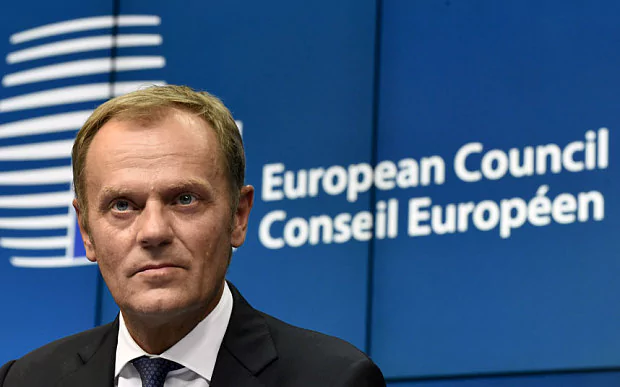The European Commission stated today that “sufficient progress” has been made during the first phase of divorce talks with Britain on the matter of Brexit, and issued draft guidelines of what a trade agreement for the future might look like.
The next step is for member states in the EU to review outcomes of the negotiations, and for the European Council to decide on as to whether or not such progress has, in fact, been achieved.
Once that process is complete, EU leaders will then be asked to finalize and approve the guidelines on which the Brexit transition and aspects pertaining to the post-Brexit future are to be based.
Following are the draft guidelines, as recommended by the President of the European Council Donald Tusk:
”Today the Commission has stated that, in its assessment, ‘sufficient progress’ has been reached in the first phase of negotiations.
It will now be for Member States to appraise the results of the negotiations, and for the European Council on 15 December 2017 to decide whether it agrees that “sufficient progress” has been achieved.
Should that be the case, the President of the European Council recommends these draft guidelines for adoption.
1. The European Council welcomes the progress achieved during the first phase of negotiations as reflected in the Joint Report and decides that it is sufficient to move to the second phase related to transition and the framework for the future relationship. It calls on the Union negotiator and the United Kingdom to complete the work on the issues pertaining to the first phase, to consolidate the results obtained so far and to start drafting the relevant parts of the Withdrawal Agreement. It underlines that negotiations in the second phase can only progress as long as all commitments undertaken during the first phase are respected in full and translated faithfully in legal terms as quickly as possible.
2. In the negotiations during the second phase the European Council guidelines of 29 April 2017 continue to apply in their entirety and must be respected.
3. As regards transition, the European Council notes the proposal put forward by the United Kingdom for a transition period of around two years, and agrees to negotiate a transition period covering the whole of the EU acquis, while the United Kingdom, as a third country, will no longer participate in or nominate or elect members of the EU institutions.
4. Such transitional arrangements, which will be part of the Withdrawal Agreement, must be in the interest of the Union, clearly defined and limited in time. In order to ensure a level playing field based on the same rules applying throughout the Single Market, changes to the acquis adopted by EU institutions and bodies will have to apply both in the United Kingdom and the EU. All existing Union regulatory, budgetary, supervisory, judiciary and enforcement instruments and structures will also apply. As the United Kingdom will remain a member of the Customs Union and the Single Market (with all four freedoms) during the transition, it will have to continue to apply and collect EU customs tariffs and ensure all EU checks are being performed on the border vis-à-vis other third countries.
5. The European Council calls on the Commission to put forward appropriate recommendations to this effect, and on the Council to adopt additional negotiating directives on transitional arrangements as soon as possible.
6. The European Council reconfirms its desire to establish a close partnership between the Union and the United Kingdom. While an agreement on a future relationship can only be finalised and concluded once the United Kingdom has become a third country, the Union will be ready to engage in preliminary and preparatory discussions with the aim of identifying an overall understanding of the framework for the future relationship. Such an understanding, which will require additional European Council guidelines, should be elaborated in a political declaration accompanying the Withdrawal Agreement.
7. The Union takes note that the United Kingdom has stated its intention to leave the Customs Union and the Single Market after the end of the transition period, and the European Council will calibrate its approach as regards trade and economic cooperation in the light of this position so as to ensure a balance of rights and obligations, avoid upsetting existing relations with other third countries, and respect all other principles set out in its guidelines of 29 April 2017, in particular the need to preserve the integrity and proper functioning of the Single Market.
8. The European Council reconfirms its readiness to establish partnerships in areas unrelated to trade, in particular the fight against terrorism and international crime, as well as security, defence and foreign policy.
9. The European Council will continue to follow the negotiations closely and will adopt additional guidelines at one of its next meetings, in particular as regards the framework for the future relationship. It calls on the United Kingdom to provide further clarity on its position on the framework for the future relationship. The European Council invites the Council (Art.50) together with the Union negotiator to continue internal preparatory discussions.”
+++ + +++



